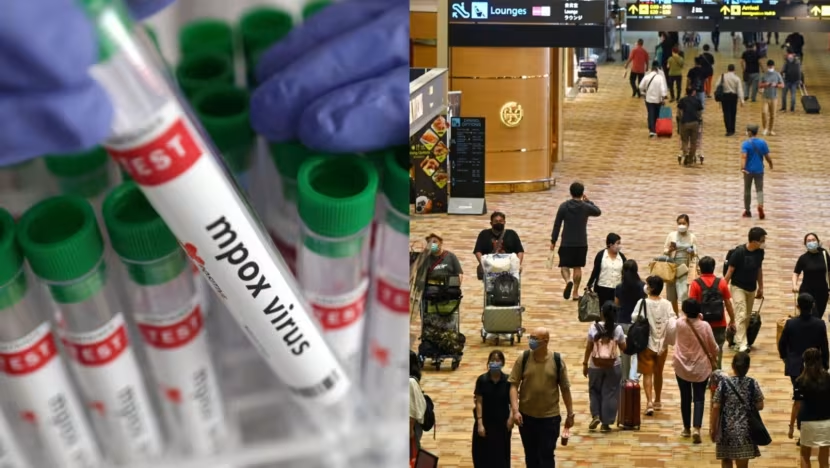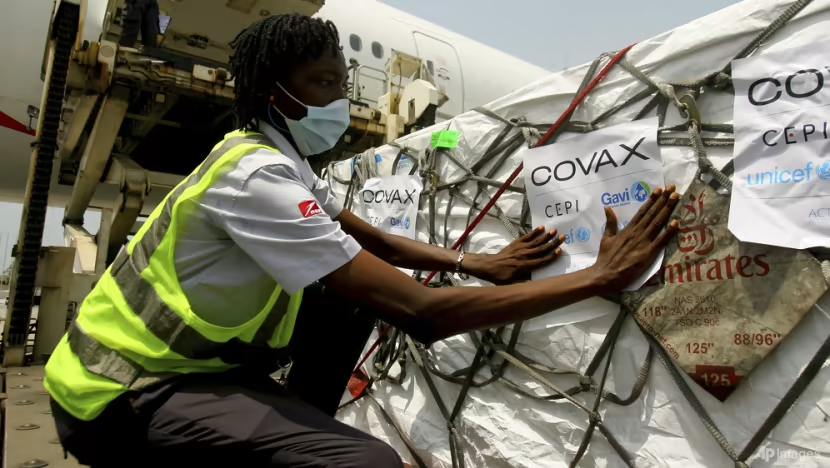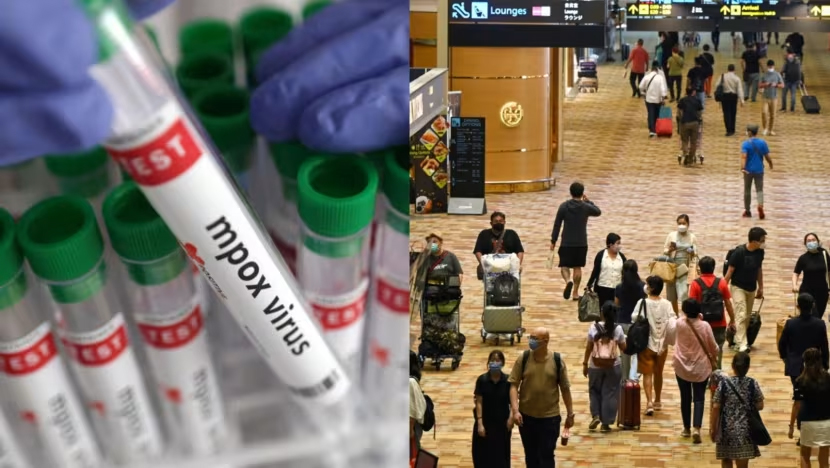The deadlier clade 1b mpox has been detected in Thailand and Sweden. The latest global emergency highlights the challenge of coordinating an effective response, says NUS Saw Swee Hock School of Public Health’s Hsu Li Yang.

Composite of (left) an illustration of test tube labelled mpox virus positive and (right) travellers walking through a transit hall at Changi Airport, Singapore, May 13, 2022 (Photos: Reuters/Dado Ruvic, AFP/Roslan Rahman)
SINGAPORE: On Aug 14, the World Health Organization (WHO) declared mpox a global public health emergency, its highest level of alert. The next day, Sweden announced the first case of clade 1b outside of Africa. On Thursday (Aug 22), it was Thailand’s turn to confirm Asia’s first known case of the new, deadlier strain.
The world is on the alert for the virus to spread more widely, with countries like Singapore, Malaysia, and Indonesia stepping up precautionary border screening measures.
The global public health machinery has sprung into action. But considering this is the second time in just over two years that mpox has been declared a Public Health Emergency of International Concern (PHEIC), it’s fair to ask: Have we learnt the lessons from the first mpox emergency or even COVID-19?
Mpox is certainly not the new COVID-19. But the lessons remain relevant.
TO DECLARE OR NOT TO DECLARE A GLOBAL EMERGENCY
It’s impossible for WHO to please everyone when it comes to deciding whether to declare a PHEIC and when to declare one.
Such declarations are formal calls to action, aimed at mobilising resources and coordinating global efforts to eliminate or mitigate the specific emergency. Call it too late and the world loses precious time helping people prevent exposure, infection and even death. Call it too early and it can be perceived as an overreaction or fearmongering.
Although the term “pandemic” is more easily understood, it lacks universally agreed-upon definitions and carries no legal obligations. Once a PHEIC is declared, WHO member states are legally obligated to cooperate internationally, share information and implement recommended measures under the International Health Regulations (IHR).
On this, it is clear that WHO has learnt its lesson from the 2022 mpox emergency.
The first mpox PHEIC was declared on Jul 23, 2022, weeks after clusters of clade 2 mpox were first reported outside Africa in May that year. WHO had been roundly criticised for the delay: The perception was that a PHEIC was declared only after the virus had spread to Western countries, even though a sustained outbreak of this virus strain has been growing in Nigeria since 2017 and spreading to neighbouring African countries without attracting much international attention or aid.
This time, facing a deadlier clade, WHO declared a global emergency at a much earlier stage while cases were still mostly concentrated in Africa. Increased vigilance is already paying off – that countries outside of Africa reported their first cases soon after the declaration should be seen in this positive light, as these could have otherwise spread undetected.
Resources are also being rapidly secured to mitigate the outbreak at source. Within a day of the PHEIC declaration, Bavarian Nordic – the company that developed the only vaccine widely approved for use against mpox today – had declared that it was ready to supply up to 10 million doses of its vaccine by 2025. The International Federation of Red Cross and Red Crescent Societies as well as other regional and global institutions have also ramped up response efforts.
Coordination of global response is still an issue. But there is now a greater likelihood of preventing an outbreak on the same scale as the 2022 mpox emergency – over 87,000 confirmed cases across 111 countries and territories, according to a WHO situation report after the PHEIC was lifted in May 2023.
MPOX IS NOT THE NEXT COVID-19
Even if mpox is a completely different disease from COVID-19 and is not a novel virus, one crucial lesson stands: The need for international cooperation and timely information sharing.
The world needs to understand the new clade 1b mpox virus, track its spread and coordinate an effective response. Effectiveness includes considerations of equity – to ensure that public health messages, education and interventions including diagnostics and vaccines reach those who are most at risk.

A shipment of COVID-19 vaccines distributed by the COVAX Facility arrives in Abidjan, Ivory Coast, on Friday, Feb 25, 2021. (Photo: AP/Diomande Ble Blonde)
The COVID-19 Vaccines Global Access (COVAX) Facility was established early during the pandemic to support more equitable distribution of vaccines to low- and middle-income countries. Singapore was an early supporter of COVAX and co-chaired an informal Friends of COVAX Facility initiative with Switzerland to promote vaccine multilateralism.
However, such efforts were undermined by vaccine nationalism from high-income countries. Wealthy nations obtained a surplus of vaccine doses at prices well beyond what low- and middle-income countries could afford, and delayed access to vaccines incurred unnecessary excess suffering and deaths.
Nonetheless, COVAX’s novel global vaccine dose donation mechanism still exists, with the necessary expertise and experience at Gavi, the Vaccine Alliance. Gavi has committed to mobilising and delivering mpox vaccine doses to Africa.
That the world is experiencing the current mpox emergency can be viewed as a failure of not having “reached the last mile” during the earlier mpox emergency.
After all, even as the milder clade 2 mpox cases decreased worldwide (including in most African states) and the PHEIC was lifted in May 2023, a different situation was developing in the Democratic Republic of Congo. Mpox cases stayed high and rose sharply from September 2023, largely due to the clade 1b virus.
Issues of national sovereignty and global health security are complex, but there is an increasing urgency with each major outbreak for countries to work together in the interests of protecting health.
The International Health Regulations regarding global preparedness and public health emergency response have been strengthened by the World Health Assembly, the decision-making body of WHO, in June. But there is still a need for a robust global pandemic agreement which unfortunately has been deferred to 2025.
ELIMINATE POSSIBILITY OF A THIRD MPOX EMERGENCY
The latest mpox outbreak underscores again the challenge posed by constantly evolving viruses.
The silver lining is that – although the global response has been imperfect on each outbreak – we have learnt from each occasion and have applied some of these past lessons to each new outbreak.
It is to be hoped that, on this occasion at least, the African countries bearing the greatest brunt of mpox can receive the necessary resources and vaccines to mitigate the impact of the outbreak before a greater global crisis develops. And better yet, to eliminate all possibility of a third mpox PHEIC declaration.
Prof Hsu Li Yang is Director, Asia Centre for Health Security and Vice Dean of Global Health, Saw Swee Hock School of Public Health at the National University of Singapore (NUS).
